Table of Contents Show
Having a small generator for camping can take your adventures to another level. Some of the best generators are lightweight and small yet can pack quite a punch.
They’re easy to move and give you the freedom to camp in exciting new places. If you want to make the most out of your time while doing some off-grid camping, you’ll need a generator.
We’ve found several of the best small generators for camping that we think you might want to consider. Let’s get started.
What Size Generator Do I Need for Camping?
Before adding a generator to your shopping cart, you should consider a few things.
The size of your generator will determine how much power it can create. Making sure you get a generator that will do the job is essential.
Let’s look at a few things to consider regarding what size generator you’ll need while camping.
What Will You Be Powering
Consider all of the electronics that you’ll be powering. Each of these appliances will require a certain amount of wattage.
Space heaters, microwaves, air conditioners, and coffee makers require a lot of power.
The more energy you’ll use, the larger the generator you’ll need.
The larger the generator, the more storage space it’ll require and the heavier it will be.
Having a too large generator can make it challenging to move around your campsite.
If you plan to run an air conditioner, you’ll likely want to get a 3,000W to 3,500W generator.
Startup Versus Running Wattage
There are two types of wattage for generators: startup and running.
The startup wattage is the peak the generator can withstand for a short period.
The running wattage is the amount the generator can deliver for an extended time.
A generator with 3,500 starting watts will have around 3,000 running watts.
However, this would cause the engine to run at full throttle, use a lot of fuel, and increase the wear and tear on the generator. You want to keep it running under 70% of its capacity.
So if you have a generator with a max of 3,000 running watts, you’ll want to keep it under 2,100W while in use.
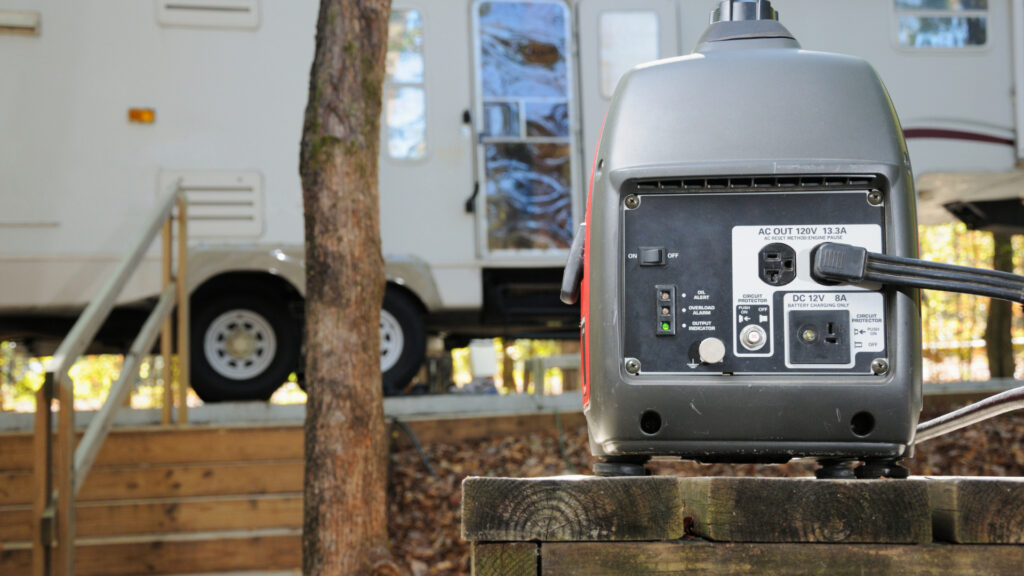
Parallel Operation for Camping Generators
Some generators connect to others to create even more power. This allows you to increase power production and reduce the strain on each generator.
Instead of one massive generator, you can have two smaller generators that you can move easier and allow you to increase the power depending on your current demand.
Not all generators can handle parallel operations.
If this is important to you, confirm the capabilities of each specific generator before getting them.
You don’t want to find out you wasted money on ones that won’t get the job done.
Pro Tip: Still unsure of what size generator you need? Make sure you check out this article for more information before purchasing to know what size you need in a generator
Conventional Generator Versus Inverter Generator
There are two different types of generators used by RVers, conventional and inverter.
A conventional generator’s engine is supposed to maintain a set speed of around 3600 rpm. This allows it to create electricity at the standard 120 volts at 60 hertz that our electronics expect.
The downside of a conventional generator is that it may vary from the perfect 3600 rpm creating “noisy” electricity. While noisy electricity isn’t bad and most devices can handle it, current electronics can’t and may be damaged.
Conventional generators also constantly run at full speed creating the same power regardless of how much energy you pull from them.
An inverter generator is similar to a conventional generator except that it uses an alternator to turn the generated AC electricity to DC electricity. Then it uses an inverter to change that DC electricity back to a “clean” AC electricity.
While this makes them slightly less efficient for the same size engine, there are a few major benefits it gives over conventional.
Inverter generators will adjust the throttle based on the load demand. This makes it much quieter and more fuel-efficient, especially when not using much power.
This also lets you use sensitive electronics with them without a worry since they are producing clean electricity.
If you plan to use your small generator for camping, you don’t want the noise to ruin the environment. Campgrounds that allow generators will often only allow inverter generators.
And if you boondock, your neighbors will appreciate the quieter inverter.
Lightweight Camping Generator Options
You need to get the biggest and most powerful generator for camping. We’ve found a handful of options that weigh under 50 lbs and can get the job done. Let’s take a look.
1. PowerSmart Portable Generator 2200 Watt
Weight: 42.5 lbs (19.3 kg)
Dimension: 21” x 14” x 20”
The PowerSmart 2200 portable generator has 2,200 starting watts and 1,900 running watts. The four-stroke engine can run for 10.5 hours while providing 475W of power.
This is a great generator whether you want to charge laptops, mini-coolers, drones, or other outdoor electronics. It hums quietly at 58 dBA, which means you likely won’t hear it in the background.
If the 1,900 running watts isn’t enough, you can connect a second generator to bring it up to 3,800W. This lightweight generator also comes with a small price tag.
2. PowerSmart Portable Generator 2500 Watt
- LIGHTWEIGHT & CONVENIENT: The weight is only 40.3 pounds. Our 2500-watt inverter is one of the lightest in the industry....
- MULTIFUNCTION: Generator has 2* AC outlet (120V), 2* USB-A ports(5V) and 1* DC car port(12V), this portable inverter...
Weight: 40.3 lbs (18.3 kg)
Dimension: 21” x 20” x 14”
PowerSmart also makes a 2,500W portable generator smaller, lighter, and cheaper than the 2200 model. It costs $450. You gain a couple of hundred extra watts and don’t have to sacrifice power plugs.
However, the PowerSmart 2500 uses the same size fuel tank as the 2200, which means it has a shorter run time. The PowerSmart 2500 can run for approximately 7 hours while delivering a quarter-load of power.
The 2,500W is also parallel capable, which means you could buy two and generate over 4,000W. That’s enough to power a space heater or air conditioner and stay comfortable while camping.
3. A-iPower Portable Inverter Generator 2000 Watts
- Produces 2,000 starting watts with 1,600 running watts of clean and safe power for sensitive electronics such as phones,...
- Complete with A-iPower’s “Low idle” technology for an extended run time of 4 hours at 100% load and 7 hours at 50%...
Weight: 50 lbs (22.7 kg)
Dimension: 22” x 13” x 20”
The A-iPower 2000 is another one of the small generators for camping that we love. Fill up the 1-gallon tank, and the four-stroke engine can run for approximately 7 hours at 50% load.
If you need to run it for a long time, it won’t be nearly as annoying as other generators. The A-iPower 2000 has 2,000 starting watts and 1,600 running watts and hums at only 52 dBA.
It’s a fantastic small generator for powering phones, TVs, laptops, and electronic devices while camping. We love that it comes with a couple of USB ports and 20 and 30-amp electrical plugs. The A-iPower 2000 is parallel compatible, which creates 3,200 running watts.
Keep in Mind: Save money on your next getaway by camping for free! Check out this article on how to use Freecampsites.net to find free campsites.
4. WEN Super Quiet Portable Inverter Generator 2000 Watt
- Ultralight body weighs in at a mere 39 pounds for easy transport and storage
- Extremely quiet operation comparable to the sound of a normal conversation according to the US Department of Health and...
Weight: 39 lbs (17.7 kg)
Dimension: 17” x 11.5” x 18”
At only 39 lbs, the WEN 56203i is the lightest generator on our list.
However, it cranks 2,000 starting watts and 1,700 running watts. With two 120V power connections, a 12V DC outlet, and two USB charging ports, you can keep everything powered while enjoying off-grid camping.
The four-stroke 79cc engine can run for 10.8 hours on a quarter-load at 51 dBA.
5. Hudson Motors Super Quiet Portable Inverter Generator 3300 Watt
Weight: 48 lbs (22.8 kg)
Dimension: 17” x 11” x 16”
This 3,300W inverter generator from Hudson Motors can run at 25% capacity for eight hours. It delivers 3,300 starting watts and 2,800 running watts.
Additionally, the Hudson Motors Inverter has built-in safety features to shut off when it detects low oil or a power overload. It only produces 62 dBA noise output, which is noisier than others on our list but still quiet.
Purchase a parallel kit, and you can connect two of these and generate 5,600 running watts. Plug your RV straight into this beast, and with proper power management, you can run practically everything in your RV.
What Is a Solar Generator?
A solar generator harnesses power from the sun to charge an internal battery.
You can also charge many of these battery banks by plugging them into a standard electrical outlet or even the 12V connection in your vehicle. They compare to the portable phone chargers that keep your phone charged on adventures.
You can plug any electrical appliances into the solar generator. You’ll often see USB and 120V electrical connections.
So if you wish to use a coffee maker, watch TV, or keep your electronics charged, these can be great options.
Pick Up One of the Best Small Generators for Camping
No matter how often you camp, having a small generator for camping is a good idea. In an emergency, you can enhance your camping experience and use it as a backup power solution.
These generators unlock a whole new way of camping, whether in a tent or an RV. So if you want to power your trip, pick up one of the best small generators for camping.
Do you enjoy off-grid camping?
Last update on 2024-07-26 / Affiliate links / Images from Amazon Product Advertising API




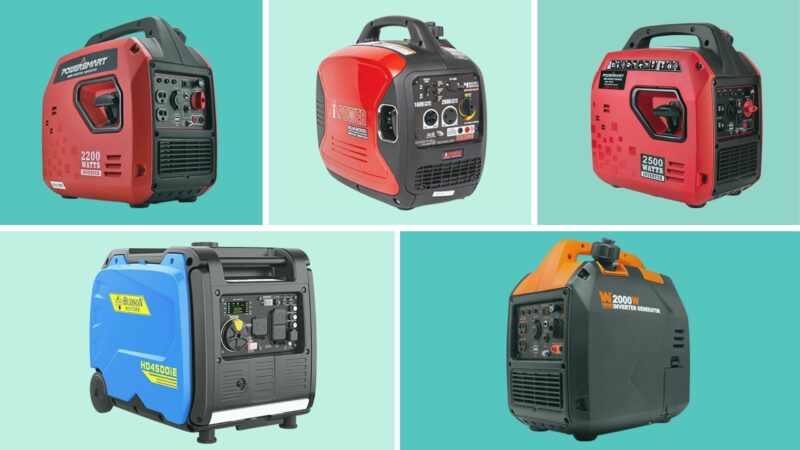

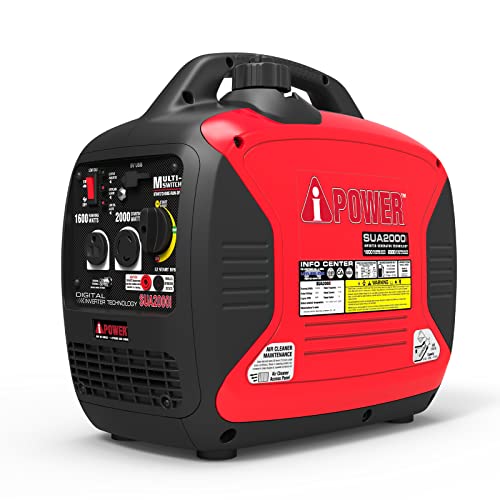
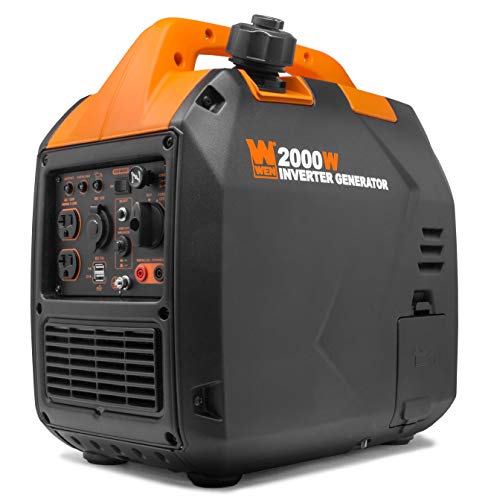
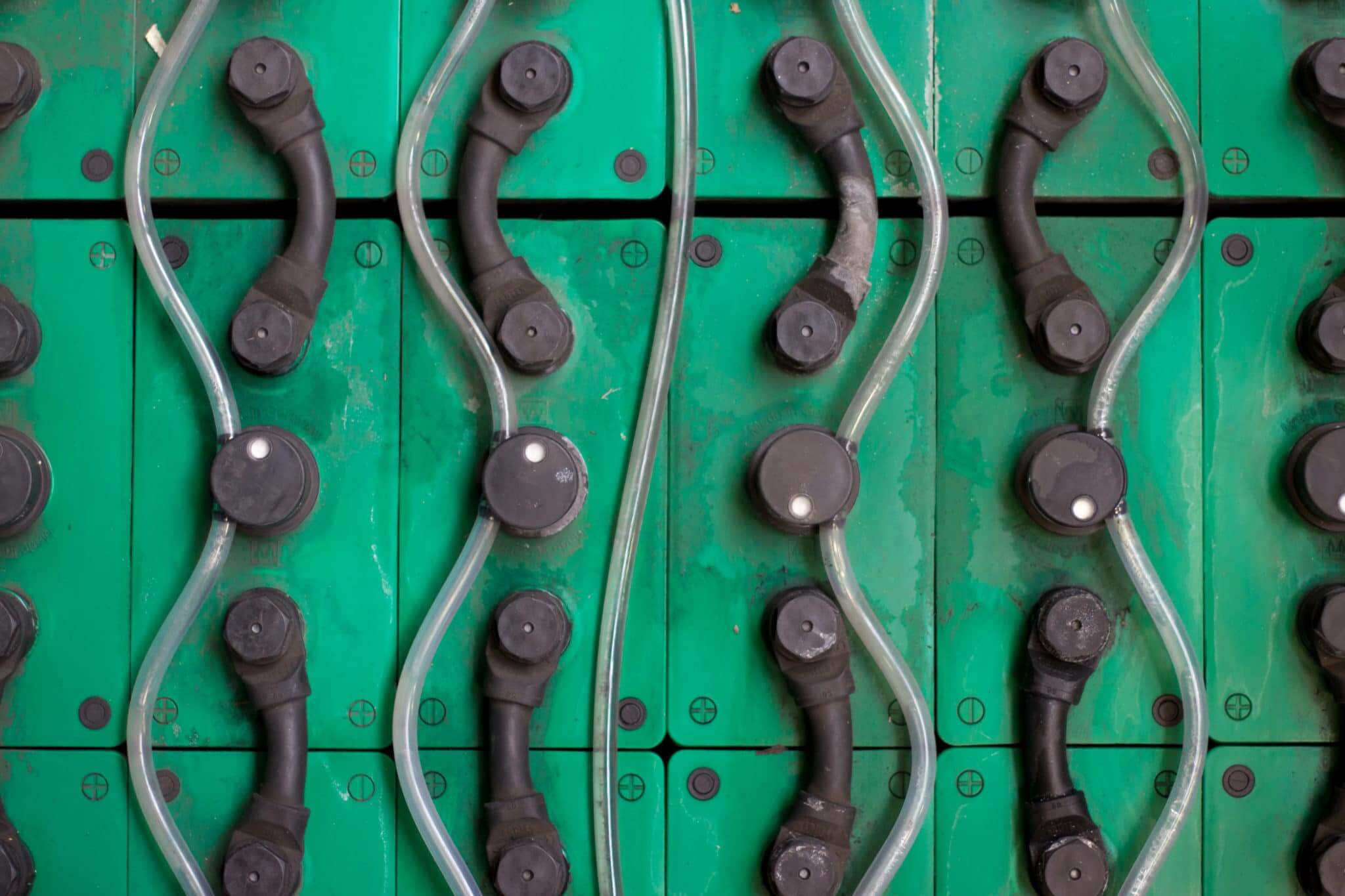

Before buying a generator, download the manual and study it carefully, especially the section on maintenance. How often do you need to change the oil? If it is every 100 hours runtime, you might be able to do it only once or a few times per camping season. If it is every 20 hours, you may need to carry equipment and supplies to change the oil in the middle of a camping trip. Another area to look at is how the generator handles high elevations. In general, the maximum power capability will be diminished at high altitude. If you are going to load the generator to near its maximum output, you might have a problem at high altitude. Some models might allow modification to work better at high altitude, but would then not work as well at lower altitude.